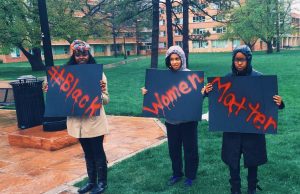Ben Fields Is One Problem and The Silent Black Male Administrator Might Be Another
By now you have probably viewed the widely shared video that surfaced Monday capturing former Richland County Senior Deputy Ben Fields questioning, grabbing, slamming and throwing across the room an unidentified 16-year old black female student at Spring Valley High School in Columbia, South Carolina.
The public debate sparked in response to this most recent display of blue on black violence provoked outrage among a black public that has been inundated with one too many real lived recordings of mostly white police officers across the United States using brute force when engaging black and brown people — and too often escaping retribution.
Shortly after viewing the video I signed onto my Facebook and Twitter accounts in a fit of rage and wrote: A black girl intervened while another black girl was violated and an unidentified black adult male remained silent and complicit. Black girls should not have to be that damn magical.
Most of my black women friends understood the sentiment. A good number of black men did as well, but critiques followed. One black man claimed to be “disappointed” in my attempt at failed “feminist uplift” and others reminded me that the black girls’ supposed disobedience was the cause that prompted the officers’ unfortunate assault.
Maybe my blame was slightly misplaced? Fields was the official who did the harm. Maybe I should not have implicated the unidentified black man at all? He is only the administrator who watched Fields chokehold, bodyslam and arrest his student. And surely there is more than enough blame to be meted out among the people and institutions involved in this particular incident of police violence, right?
For instance, we should ask why this particular school district, and so many others, relies on law enforcement officers to create safe environments. We should be alarmed that a substantial number of the students expelled and suspended in public schools in the Southern states happen to be black and among them black girls are most likely to be punished. And we should be ashamed that our culture is one shaped by an explicit disregard for the bodies and well being of black girls, so much so that a weight-trained white male officer already under fire for abuse of power felt it within his right to toss a young black girl across a classroom while an unidentified black male administrator quietly looked on. Maybe my disappointment in the black administrator is illogical? His job is to manage student engagement and Fields’ former job was to police students, right? No.
Fields and the seemingly acquiescent black male administrator are actors in this violent scene who signify male authority. The close proximity between black girls/women and men — white, brown or black — who have the potential to physically harm them (like Fields) or remain complicit in or silent when they are harmed (like the administrator), is a crucial concern we black men must consider.
It’s a difficult conversation for so many of us black men to have. It is not easy to admit that the lifetime rate of rape and attempted rapes is much higher for black women than it is for white women and that black men might be the perpetrators. It is not politically fashionable to publicly admit that men who look more like me than they do Fields may have killed so many black transgender women. Focusing on intra-racial power differentials and violence might come off as a divisive turn from black communal uplift. This type of talk might read as the dirty laundry black folk need not air, but avoiding lived realities of so many black women and girls is to further evade our collective liberation. We need to tell the truth.
And if I am honest, the black administrator reminded me of so many of the black men who quietly watched or did not show up when the black women in my life were punched, thrown, kicked and nearly killed by other black men. One black man and friend of my father once looked on as my dad repeatedly slammed my mother to the living room floor. And truth is, some black men, many of whom were witnesses, encouraged my father to be violent by saying and doing absolutely nothing.
I get it, though. I am too familiar with the trepidation that arises in the presence of police officers who might read my intervention as an attack — officers who might easily shoot me in response. The administrator could have been terrified of being physically hurt. But he could have also been okay with the handling of what he considered to be a disobedient female student. Both are possibilities.
I also know how the beatings or killings of black cisgender heterosexual men tend to make the collective heart of black communities skip a beat in ways that it doesn’t when black girls and women are assaulted or deadened by white police, or more, those who look like the administrator — and me. I’ve too been silent on occasion. I get it.
I know how easy it is to choose to do nothing in the presence of unspeakable terror inflicted upon black girls and women, cis and transgender. There were times I remained silent in the presence of other men who verbally dogged women. On some occasions I was too scared to speak up, too afraid to appear preachy, too normalized in a culture of misogyny to care. I’ve also walked by men as they hit women because I feared that I too would need to fight and on one occasion almost did.
Let this not be read as a defense of the patriarchal idea that black men are saviors, gods, and heroes whose job it is to protect helpless black girls and women, however. Male-centeredness and power, regardless of how chivalrous it may appear to any of us, is not the answer to the problem of antagonism aimed at and harming black girls and women. Equitable concern and responsiveness is—not silence. Niya Kenney, the black girl who tried to intervene and was arrested as a result, exemplified what it means to practice shared concern. She tried to help despite the possibility of retribution. She should not have had to intervene in the presence of adults charged with her and her classmate’s care, however.
We must work to extend the same urgent concern to black women and girls, particularly in a moment when “black lives matter” seems to really signify the value of black cisgender heterosexual male lives only. As long as some of us men witness violence in silence and as long as some of us are guilty of violating black women and girls ourselves, all black lives don’t matter to us in actuality. Simultaneously, we can’t place blame on black men singularly as if we don’t exist within a system of anti-black racism and sexism that shapes our skewed perceptions of black girls as unworthy of our collective care, as bodies ripe for pillaging and abuse, as subordinates, as people who ought to know their place.
Still, black men, we have to do more than #SayHerName. We have to help ensure that black girls and women are alive to say their own name. And while I love the #BlackGirlMagic hashtag, black girls should not have to be that damn good at magic to stay clear of violence, especially the harm inflicted upon them by way of our deeds and hands.




Pingback: Ben Fields Is One Problem and The Silent Black Male Administrator Might Be Another – Citizen Ed